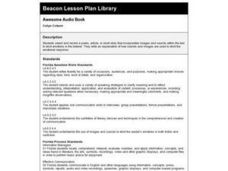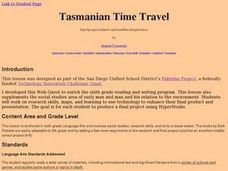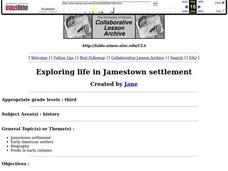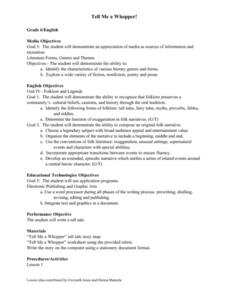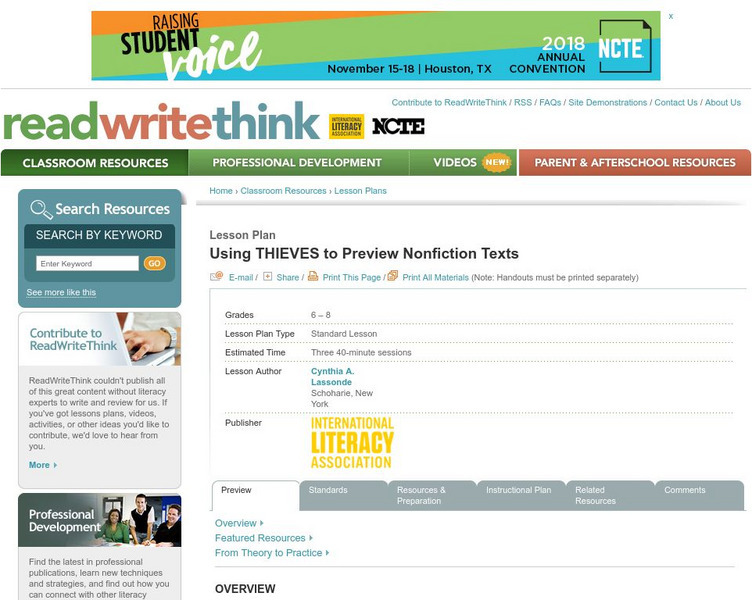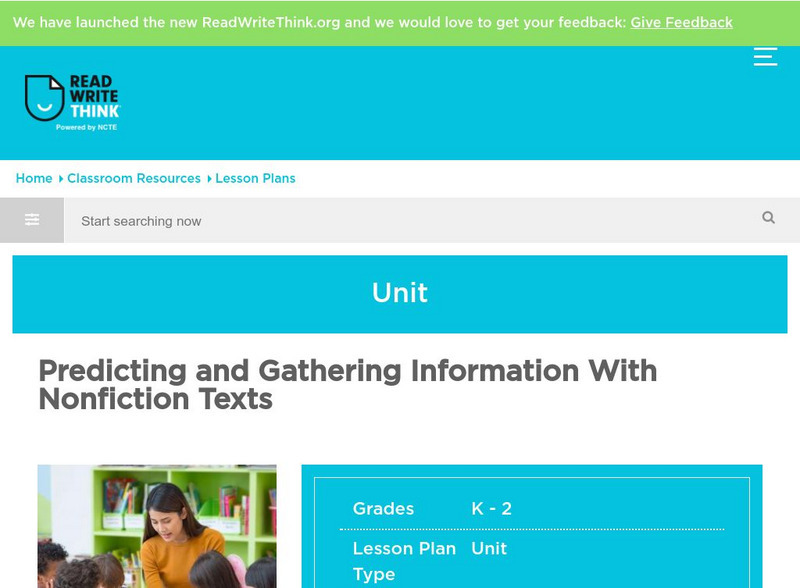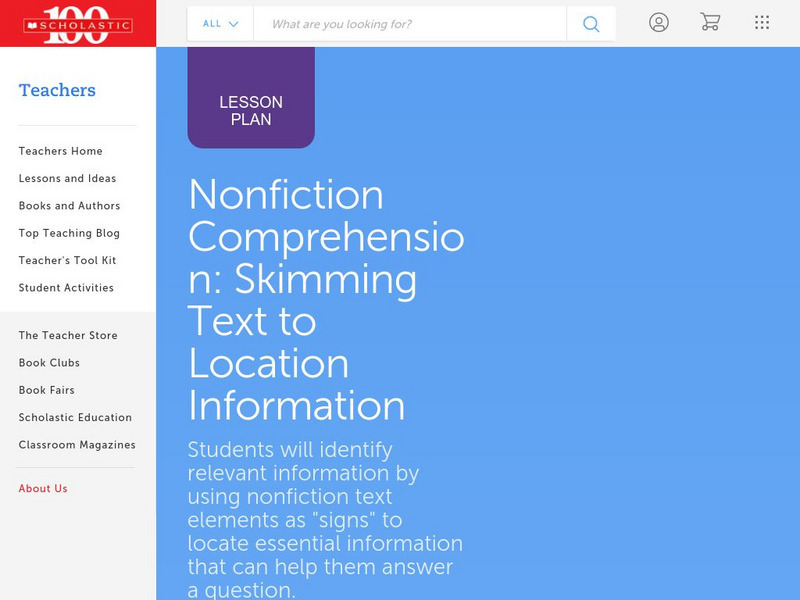Curated OER
Make Way for Ducklings
First graders use skills to collect, organize, and interpret data. They compare and contrast two stories, Make Way for Ducklings and Chibi: A True Story From Japan. Students create a duckling.
Curated OER
Postcards from the Past
Young scholars create postcards from the past by summarizing a historical event. Then they design illustrations for their postcards and send them off to another teacher at their school.
National First Ladies' Library
States' Rights: 1798-1860
Students develop an annotated timeline specific to the concept of States' Rights. They research an example to the doctrine noting how the ideas change and beome more specific as time passes and discuss their findings through class...
Curated OER
Rare, Fat, Flabby, Big-Mouthed Sharks
Young scholars research Megamouth Sharks and write paragraphs based on their findings.
Curated OER
Awesome Audio Book
Learners choose a written piece and present it aloud in a student-made recording. They analyze how sounds are used to elicit emotion.
Curated OER
Tasmanian Time Travel
Sixth graders perform research using the Internet about the Tasmanian Devil. The project can be presented in a variety of ways. The use of computer software is important for students to know, specifically Hyperstudio.
Curated OER
Exploring Life in Jamestown Settlement
Third graders locate Jamestown settlement on a historical timeline and research colonial life. They name a restaurant, identify who their potential customers might be and prepare a typical colonial menu.
Curated OER
Exploring Life in Jamestown Settlement
Third graders examine life in early colonial settlements. Students investigate what settlers ate and create a menu for a fictitious restaurant in a settlement.
Curated OER
Tell Me a Whopper!
Sixth graders investigate tall tales as a literary genre. They listen to a number of tall tales to discover how exaggeration is used as a story element. They write and publish a tall tale using word processing software. They illustrate...
National First Ladies' Library
Are We There Yet?
Pupils study the wide-reaching effects of the Cold War, even to its involvement in domestic road construction. They research the National Defense Highway System (Eisenhower Highways) for information about the creation of the program, the...
National First Ladies' Library
Fitness for Life
Students discuss their favorite activities and determine which activities are suitable for older people. In groups, students research the benefits of aerobic exercises and the equipment needed. Students share their information with the...
National First Ladies' Library
Rock the Vote! But When?
Middle schoolers research and examine about voting turnouts in the United States and around the world. They assess about various aspects of the so-called "youth vote," and have an opportunity to consider the meaning of the vote in a...
British Library
British Library: 19th Century Non Fiction Texts: Work & Welfare
This thematic collection will allow students to read and understand 19th-century non-fiction texts, and support them in identifying key features for a range of genres, audiences, and purposes. Each source is accompanied by original...
British Library
British Library: 19th Century Non Fiction Texts: Gender, Behaviour & Etiquette
This thematic collection will allow young scholars to read and understand 19th-century non-fiction texts, and support them in identifying key features for a range of genres, audiences, and purposes. Each source is accompanied by original...
British Library
British Library: 19th Century Non Fiction Texts: Education
This thematic collection will allow students to read and understand 19th-century non-fiction texts, and support them in identifying key features for a range of genres, audiences, and purposes. Each source is accompanied by original...
British Library
British Library: 19th Century Non Fiction Texts: Crime & Punishment
This thematic collection will allow students to read and understand 19th-century non-fiction texts, and support them in identifying key features for a range of genres, audiences, and purposes. Each source is accompanied by original...
ReadWriteThink
Read Write Think: Using Thieves to Preview Nonfiction Texts
Contains plans for three lessons that introduce a nonfiction prereading strategy with the acronym THIEVES, which stands for Title, Headings, Introduction, Every first sentence, Visuals and vocabulary, End Questions, and Summary. In...
ReadWriteThink
Read Write Think: Animal Study From Fiction to Facts
Contains plans for five 50-minute lessons that ask students to compare and research information about animals from fiction and nonfiction texts. In addition to student objectives and standards, these instructional plans contains links to...
ReadWriteThink
Read Write Think: Reading/writing About Whales Using Fiction and Nonfiction Texts
Students will have a whale of a good time in this lesson in which they use fiction and nonfiction texts to write a letter to an online scientist.
ReadWriteThink
Read Write Think: Comprehending Nonfiction Text on the Web
Contains plans for three lessons designed to improve comprehension of nonfiction, especially nonfiction texts on the web. It focuses on identifying text features, locating specific information, and generalizing that information. In...
ReadWriteThink
Read Write Think: Motivating Students to Read Nonfiction
This lesson plan deals with timelines in connection to nonfiction reading. Included in the lesson plan is an overview, practice, objectives, resources, preparation, and more.
ReadWriteThink
Read Write Think: Predicting and Gathering Information With Nonfiction Texts
Contains plans for eight short lessons that introduce nonfiction texts to second grade young scholars. In addition to objectives and standards, this instructional plan contains links to sites used in the lessons as well as assessment and...
Scholastic
Scholastic: Lesson Plan for Nonfiction Comprehension: Skimming Text
Build comprehension by developing reading strategies for use with nonfiction text. This lesson focuses on teaching students to recognize text elements as clues to help them quickly locate key information in text.
ReadWriteThink
Read Write Think: Reading Informational Texts Using the 3 2 1 Strategy
Learners can count on using the 3-2-1 strategy to help them successfully comprehend and write about an informational text.




